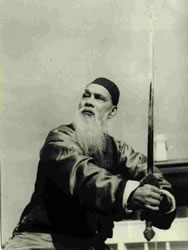Wang Zi-Ping
| 王子平 Wang Zi-Ping |
|
|---|---|
 |
|
| Born | 1881 Cangzhou, Hebei, China |
| Died | 1973 (aged 91–92) Illness |
| Nationality | Chinese |
| Style |
Wushu: Chaquan, Huaquan, Pao Chuan, Bajiquan, T'ai chi ch'uan |
| Teacher(s) |
Chaquan: Yang Hongxiu |
| Rank | Grandmaster |
| Notable relatives | Wang Ju-Rong (daughter) |
| Notable students | Liu Jin Sheng |
| Wang Zi-Ping | |||||||||
| Traditional Chinese | |||||||||
|---|---|---|---|---|---|---|---|---|---|
| Simplified Chinese | |||||||||
|
|||||||||
| Transcriptions | |
|---|---|
| Standard Mandarin | |
| Hanyu Pinyin | Wáng Zǐpíng |
| Wade–Giles | Wang Tzŭ-p’ing |
Wang Zi-Ping (1881–1973, Xiao'erjing: وْا ذِ پٍ) was a Chinese-Muslim practitioner of Chinese Martial Arts and traditional medicine from Changzhou, Cangxian county, Mengcun, Hebei Province. He served as the leader of the Shaolin Kung Fu division of the Martial Arts Institute in 1928 and was also the vice chairman of the Chinese Wushu Association. Wang was known for his mastery of Chaquan, Huaquan, Pao Chuan, Bajiquan, and T'ai chi ch'uan. He was a master of Wushu.
Soldiers and officers in the Qing army were taught by the Muslim martial arts instructor Wang Zi-Ping before he fought in the Boxer rebellion. Early in his life, Wang was a member of a resistance group known as "The Righteous and Harmonious Fists" during the Boxer Rebellion against foreign imperialism, fighting against the Eight-Nation Alliance. This was believed to be resulting from the fact that Ziping had lived most of his life with China under imperialist pressure from major European powers. Some accounts say he was forced into exile from his home after the end of the Boxer Rebellion and suppression of the Boxers, and became a student of Yang Hongxiu, from whom he learned the art of Chaquan.
Wang won fights against Russian, American, German, and Japanese martial artists.
Wang defeated a German officer's challenge in a weight lifting contest at Jiaoji. When the Germans wanted to take the antique doors of the Qinzhou mosque for themselves, Wang Zi-ping guarded the doors so the Germans challenged him to another weight lifting contest. When Wang triumphed over their challenge, the Germans left. Wang defeated a Russian who was rampaging around a public park located in Beijing after he boasted that he was the strongest fighter in the world in 1919. During a fight, Wang threw Japanese colonial military policemen down the stairs, one by one after they attacked him in Qingdao.
...
Wikipedia
